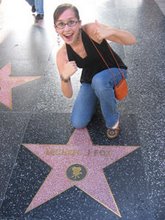Why am I a film studies major? Well, I suppose any college student questions why they chose their course of study, but with this one I can't quite explain it away by saying that I'm going to make a ton of money in I-Banking after I graduate. I came to a college with a gov/econ focus because I was intending to go into foreign service. One year and a dropped intro to economics class later, and I found myself declaring as a literature major.
Oh, the life of a lit major is as glamorous as you'd imagine, I promise. I think I read more when I was in elementary school. Oh well, I'd rather write essays than take exams any day. Also, it's a nice thing to have on my diploma as someone who takes great pleasure from the smell of old pages in stacks and stacks of library books.
So then as a sophomore I met Professor M. Oooh, Professor M. What a man... I was taking his journalism class in order to explore some career options, and I just became totally smitten. I signed up for his screenwriting class the next semester just so I could be close to him, but instead I found myself on a new career path with a second major.
I'm not the biggest fan of film majors, usually. Sometimes class discussions about Baudrillard and postmodernism feel like one big circle jerk of affected quasi-intellectualism, but then I find myself telling uninterested friends about the simulacrum or mise-en-scène, and I have to check myself (before I wreck myself). But I do so love cinema. And I like having the excuse as to why I watch so many movies and TV shows that it's research for my intended career as a screenwriter.
********************************************
In my Intro to Video Production class we've been talking a lot about the implications of the transition from film to digital. At first I didn't think the change was very meaningful past economics, but I've come to change my mind. As far as visual quality - sure, that's a given. But now with the cost-effective practice of filming digitally and editing to give "the film look," that's not even the most important part of the discussion. Ownership and distribution are obviously a big deal in the equation, too. With cheap cameras and YouTube, anyone can be a celebrity, and any material can be seen worldwide. I maintain that this is both a good thing and a bad thing, and refuse to come down strongly on either side.
But it was something I heard Quentin Tarantino say in a radio interview the other day that really struck me. "When you talk about the magic of cinema," he said (don't worry, I'm totally paraphrasing), you're referring to the illusion of movement. A film strip is just a row of static images which, when applied to the proper equipment and amount of light, trick us into believing that we are watching a moving image. With digital video, we are denied this magic. Not to say that beautiful, meaningful things can't be created digitally, but there is a lot to be said for celluloid moments like when Kate Hudson wipes away a tear from her right cheekbone with her left hand in Almost Famous, smiles, and asks, "What kind of beer?" Totally magical.
~Kat
Subscribe to:
Post Comments (Atom)




3 comments:
I would assume Morrison, our lovely out professor at CMC, other than Bilger. I have yet to take him, but want to for an elective. I've heard great things.
Alas, no. Though I love Morrison, he is not the one I pine after...
Also, history prof Diana Selig is out, too!
Post a Comment